 |
  |
 |
  |
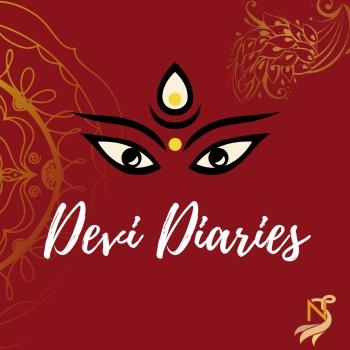 Devi Diaries 2021: Part 2 October 31, 2021 Devi Diaries 2021: Part 1 Oct 17 Contemporary showcase: Everyday Goddesses  PARAMITA SAHA @artsforwardindia The Devi Everyday: DAYVI The everyday goddess struggling to make do with the many struggles of mundane life; yet loving, protecting, caring, creating and nurturing. Sometimes angry, sometimes eyes brimming with love, often standing up against serial and societal oppression, many times falling and failing. But always picking herself up. And her weapons. And starting another new day. The Devi Everyday: Dayvi Concept, Choreography and Performance: Paramita Saha Music: Shadowblink Videography and Edit: Shailpik Biswas Mask: Swarup Dutta 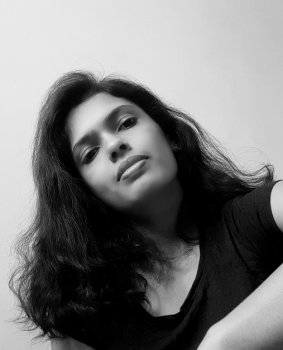 SNIGDHA PRABHAKAR @snigdhaprabhakar DEVI Devi, an idea loved and respected by majority of Hindus. An idea they use as examples to associate with the present. An idea that makes sense to them and is relatable. That they pray to, for hours. Festivities revolve around the idea of Devi. An idea/understanding of an ideal wife, mother and householder, a force of creation, preservation and destruction. Association of Devis with Devas. Acceptance revolving around this association. Respecting and praying to the idea of both masculine and feminine energies residing in all humans. What happens when the idea becomes reality? Resistance is built in response to confronting the power of creation, preservation and destruction. There is acceptance when it is a mere idea or belief and resistance of the same in real life. Little girls ought to get confused whether to believe in the Shastras that they are taught. When they become the witness or even victims of disrespect, harassment and pain in real lives. Sometimes by their own parents and family members. Women are the power and force of creation, preservation and destruction. Not just an idea to pray to but an entity to live and co-exist with. Co-existence is what women of the present and recent past have been fighting for. Mere co-existence as equivalent to their male counterparts. We are still fighting! 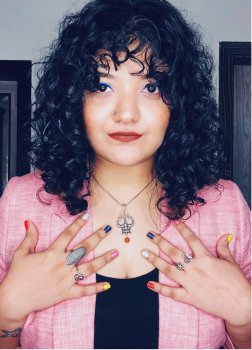 ANJANA GHONASGI @anjana.ghonasgi AHALYA: THE UNBLEMISHED ONE A new wave of female authors like Chitra Divakaruni and Kavita Kane have rewritten mythological tales giving a lead voice to female unsung characters. Taking inspiration from that, The Unblemished One charts the internal journey of resilience and finding the feminine divine within oneself. This journey isn't all sunshine and roses. It requires radical honesty to undo all our conditioned selves. Ahalya chips away at herself to come into her own. A woman that's free in her mind and body, challenges society and brings about change.  RONITA MOOKERJI @ronitamookerji NARI (Woman) Nari is a digital journal of a single day (from morning to night) in a Contemporary female artist's life in today's India. With the onset of the Covid pandemic, this life feels like an altered, dystopic reality. A female being in isolation takes the route to explore the Nava Rasas or the Nine Emotions deeply inculcated in the Indian cultural aesthetics. Highly charged up by the emotions running wild and unaccountable for, within the restriction of the four walls of isolation - this 5 minute video montage of self-portraits uses the perspective of a 'peep-hole' into my existence, exploring the limitless spectrum of emotions/essence within limitations. A scribbling in my personal diary would read: Challenged. Defiant. Depressed. Choked. Surreal. Distortion. Fear. Angst. Exhaustion. Power. NARI is a resultant of internalized isolation, grief and loss through the filters of the Nava Rasas trying to fit in the question: What empowers a female being in isolation? Having been a Bharatanatyam dancer for over 20 years and branching out into the profession of a Contemporary dancer /performer/choreographer over 13 years now, I investigate and depict through this short video, how the Nava Rasas play a role in the deep-seated complex myriad of emotions experienced by a woman in her urban existence through the pandemic. In the poem: Miracles in the Mundane by Shetal Mehta... "What is a story? Not mentioned in an elaborate classic, But on the fields of war, Where I endlessly fight the odds; Sometimes I win, but today I lost, And as I close my eyes, for once and all, I witness my miracle call." Concept and Performance: Ronita Mookerji Video edit: Gaby Davies Vocals: Nithya Shikarpur 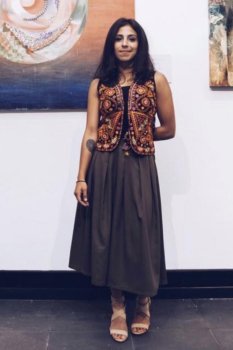 SEHER NOOR MEHRA @sehernoormehra BHUMI DECODED 'Bhumi decoded' is the unravelling of the story of Mother Earth. The initial inspiration came from the Buddhist Goddess Tara in Her 'khadiravani' form - because of Her associations with the forest and Her ever evolving sense of motherhood, the piece unravelled more and more to become symbolic of Mother Earth and hence 'Bhumi Devi'. Her core remains unchanged, Her faith in unconditional love and holding on to Her beliefs of being empathetic and giving- irrespective of the world (almost like Her child) around Her crumbling, being exploited, manipulated from the fresh smell of mud to what it has become today, 'a concrete jungle'. But even today through the struggle, Her light remains unchanged - She holds on to it until the end. Concept, choreography, direction and editing: Seher Noor Mehra Music created and produced by Bayan Jaber Ansari Special thanks to Aditi Singh Video Oct 18 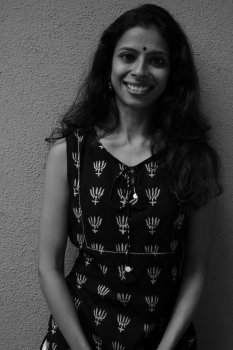 Eesha Pinglay  Mrinal Joshi 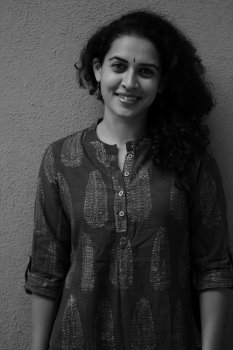 Radhika Karandikar (Bharatanatyam) @eeshapinglay / @radhikakarandikar27 / @dancingfeet_mrinal RAKHUMAI Rakhumai, the wife of Vitthala of Pandharpur, is believed to be the reincarnation of Padubai. In this avatara She is believed to have formed from a lotus. The first segment of our dance explores this thought of Rakhumai coming to life when She is invoked by Her bhaktas. As She is formed, She is praised and hailed by a Rukmini ashtakam in the second segment of the dance piece. Her beautiful attributes are praised here offering obeisance. (Rakhumai in this avatara becomes the mauli (mother) of every household of Maharashtra crossing the barriers of caste and community. Ovis - verses in praise of her in regional language - are written by Her bhaktas who could not read or write but are immersed with their love and devotion for Her. These Ovi-s/Ovya are sung everyday by the women while doing their household chores.) According to folklores, Rakhumai is known to have left the abode of Vitthala. Even today, She resides in a separate temple in Pandharpur. In the third segment, through an Ovi, She is reminded that She's the Mauli of this world as well as Vaikuntha and therefore all Her bhaktas are incomplete just as Vitthala without Her. They request Her to come and shower them with Her motherly love and blessings. The language is mainly Marathi as the literature is in regional language. Concept: Pracheta Bhatt Choreography: Eesha Pinglay Dancers: Eesha Pinglay, Mrinal Joshi, Radhika Karandikar Music composition: Karthik Hebbar Lyrics: Niranjan Parandkar Vocals: Sanika Kulkarni Percussions: Prajesh Nair Flute: Avadhoot Phadke Recording studio: Kalashree Studios Mixing and recording: Atharva Nigade Camera: Sejas Mistry Video editing: Eesha Pinglay Video Oct 19  PRABAL GUPTA (Kathakali) @probs_gupta12 (CHUZHALISHWARI) KARTYAYANI Written by Guru Sadanam Balakrishnan The role of the dancer is that of an ardent devotee of Devi Kartyayani. She visits the temple early in the morning and as she opens the temple gate, she is mesmerised by Devi's divine appearance. She humbly praises the Devi and bows to Her who bestows us with immense happiness. She is not only divinely attractive but is also the ultimate source and the form of knowledge. She is endowed with fish-like eyes and is worshipped by the Trinity Gods (Brahma, Vishnu and Shiva). She, if worshipped with utmost devotion, enables one to overcome all problems and sins. She is settled in Kalyasseri, Manakulangara. She is Devi Kartyayani or Chuzhalishwari, the Goddess of the world. As the lotus blooms being embraced by the pleasing rays of the rising sun and its fragrance engulfs the world, similarly we get blessings from the lotus eyed Devi who has a conch like throat by worshipping Her lotus like feet. I bow to the Devi Chuzhalishwari who is endowed with black clouds like shining hair bedecked with flowers. Her bluish black serene form enchants the three worlds. Oh Devi, please protect me. Let the beautiful morning be enriched with your blessings First Slokam: Ragam Nata Second slokam: Ragam Mohanam Third slokam: Ragam Bhageshree Language: Malayalam Music composition & vocal: Sadanam Sivadas Edakkya: Sadanam Ramakrishnan Flute: Rajesh Kallelangara Choreography guidance: Guru Sadanam Balakrishnan Video Oct 20 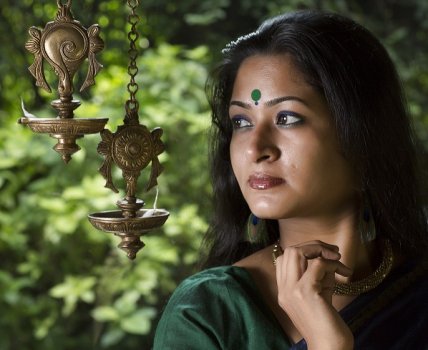 PURVADHANASHREE (Vilasini Natyam) @purva.dhanashree BHUDEVI The iconic representation is from Telugu folk traditions. It is different from Bhu Devi as worshipped in Vaishnava temples. She is the Goddess of the peasants. BHUDEVI GANAMU is a song dedicated to Mother Earth who is visualized as Prakruti - Nature. The devotee goes to Her shrine everyday and worships Her with a lot of devotion and love. One day carrying the burden of pain and hopelessness, she cries to her Mother asking her: "Have You forgotten me? I am drowning in the ocean of problems Are You even there to notice my pain? I worship You every day; are You even looking at me? Can You please show mercy to all Your devotees and guide them towards the right path? In one hand You hold crow, in another You hold fish In one hand a child, and in the other a deer. You are sitting calmly (leaving me like this), why have You given me birth in this false world?" Dejected, she turns away from her Mother but realizes soon that she is always protected by Her. She asks herself: "What use are these lips if they cannot sing the praises of Bhudevi? What good are these ears if they don't listen to the greatness of Bhudevi? What good are these hands if they don't serve Bhudevi? What good are these eyes if they don't see the resplendence of Bhudevi?" With a new energy and belief the devotee dances ecstatically chanting the name of Bhudevi. The subtlety, spontaneity and naturalness give Vilasini Natyam abhinaya a unique quality. The flow of hand gestures, fluidity in limbs and typical feet movements distinguish the delineation of ideas in Vilasini Natyam. Language: Telugu Video Oct 21  DEBANJALI BISWAS (Manipuri) @ilajnabed_ MEENAKSHI MEENAKSHI STUTI - This invocation to the Devi is adapted from select verses of the Meenakshi Pancharatnam attributed to Adi Shankaracharya. In the poet's description of Meenakshi, I see a harmony of myth, history, and lore of princess Tadadakai, and the presiding deity of Madurai. I see the coming together of strength and kindness. The refrain in this composition reminds us that She is the ocean of nectar of compassion, whose mercy is boundless. From Her carefully coiffed hair, to the jingling of Her anklets, Her divine form shows grace. Not only is She the epitome of elegance and wisdom, She is a fearsome protector in whom one would find bliss and peace. The dance describes the attributes of a powerful woman - a dauntless warrior, a regent, a divinity luminous in transcendental glory. Musically this invocation blends the southern Carnatic style with the eastern Nata Sankirtana style. This composition in Manipuri emerges from an assimilation of traditions, symbolizing a unity of philosophical thoughts in the arts. What inspired me to choreograph this as an invocatory dance is the resilience, empathy and generosity we have witnessed in the world around us, emerging in times of fragility. The depthless ocean of compassion lies within us too. Language: Sanskrit Music: Manipuri Nata Sankirtana style: Composition & Percussion: R.K. Upendro Vocals: Thokchom Lansana Chanu Moibung & additional percussion: personal recording from on-site ritual Carnatic style: Composition & Vocals: Vrinda Kandanchatha Choreography, Camera and Editing: Debanjali Biswas Video Oct 22  ANWESA MAHANTA (Sattriya) @anwesamahanta PRAKRITI I present an excerpt from a work celebrating Prakriti Darshan from my production Prakriti Purusha. The piece based on Bhakti literature of Sattriya, celebrates the female energy as a microcosm of Purusha giving birth to life force. Language: Sanskrit Video Oct 23 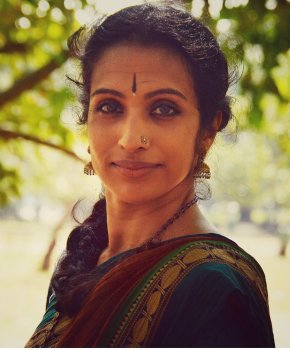 DIVYA NAYAR (Bharatanatyam) @2dancingfeet NEELAYATAKSHI Waking the Sleeping Goddess of Nagapattinam An excerpt of the Neelayatakshi Suprabhatam. The fragrant flowers have awoken and so have the birds that sing morning's song. It's that time when the sun mischievously smiles at the night sky. Goddess Neelayatakshi! Won't You heed our gentle song to awaken You? Composer: Nagai V Ramaswamy (21st c) Language: Tamizh Video Oct 23 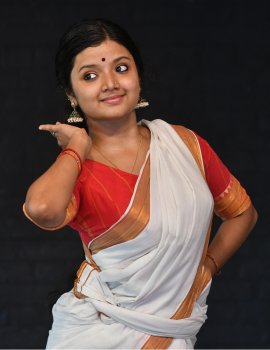 SANDRA PISHARODY (Mohiniattam) @sandraradhakrishnan14 KALI Being a Keralite, I have visited several 'Kavus' (groves) of Goddesses especially in the middle region of Kerala. This Kavu tradition and the mother Goddess worship are very unique and the various art forms like Theyyam, Mutiyettu, Tiyattu etc. are related to the same cult. As we could see in the Kavus like Kodungallur and Chottanikkara, the Goddess possesses the power of healing and warding off evils. Even today, many Kavus exist in different parts of Kerala where various forms of Devi are worshipped. Mookkuthala Bhagavathy Temple (Malappuram) and Parakkat Sree Bhagavathy Temple (Palakkad) are the examples for the Kavus. My presentation is based on the Goddess Kali. This is a composition of Kavalam Narayana Paniker and the kriti is known as NIRAM. In this kriti, Goddess Kali is described from head to toe with utmost beauty. A devotee seeing the Goddess is mesmerised looking at Her toes covered in gold, then the heels and feet. The beautiful stomach is like a banyan leaf and Her lovely bosom is covered with gold garlands. She is taking the form of 'Kali' holding sword, shield, Trishula (trident) and Darika's (demon) head in Her different hands. Her glowing third eye, the round face and the curly hairs falling on Her forehead looks so charming. While looking at Her face, the protruded teeth and the tongue are seen. At last, Her long tresses resemble the dark clouds, thus the entire body is described with its every detail in a few lines. Oh Goddess! Seeing You in Your absolute form, I am gratified. I bow down at Your feet. Language: Malayalam Composer: Kavalam Narayana Paniker Raga: Dwijavanthi / Thala: Adantha Dance choreography: Sandra Pisharody Videography: Anand Madhu Music credits: Vocal: Neelamperoor Suresh Kumar Maddalam: Kalanilayam Prakashan Veena: Murali Krishnan Video Oct 24 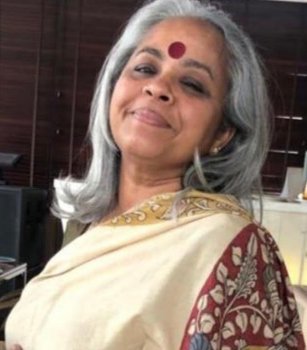 JAYA RAO DAYAL (Bharatanatyam) ARANYANI SUKTAM To my mind, the Devi is all pervasive, so powerful that one cannot enshrine Her ... only the forest can be Her home. The Suktam talks about the Goddess who does not till the land and yet has bountifuls to offer to mankind ... it goes on to say that She does not harm anyone, unless some really harmful enemy approaches. This to me is the crux of today's civilised world where humankind wants to do away with forests and we will have to face the wrath of the power that keeps the forests. The lyrics in Telugu are a translation of the Aranyani Suktam, which is the 146th suktam found in the 10th mandala of the Rig Veda, It is said to have been compiled by the sage Airammada. It hails the Goddess of the forests. Suktams, as a rule, preclude vocal renditions other than the way they are meant to be enunciated. Hence the translation into Telugu made it more conducive to setting it to a raga and thereby using it for choreography. The Sanskrit to Telugu translation has been done by Vasu Nyayapathi and was set to Ragamalika and sung by Venkateshwaran Kuppuswamy. Translation from Telugu to English has been done by Jaya Rao Dayal. O Goddess of the Forests Eulogised by Airammada Far from our village This uninhabited forestó Is this not your home? Are you not afraid of being here, all by yourself? In response to the bellowing of the cow The cicada with its shrill voice Both in a mad-like duel O Mother Seem to sing your victory song An auspicious melody It appears to us Far away The cattle seem to be grazing And farther It appears to be a habitation of humans Mother One can hear the cart being readied Someone is calling out to the cows Someone is felling a tree As dusk falls Mother In your presence One can hear voices here 'The Goddess of the Forest Harms not the person who does not harm others'. Having consumed the sweet fruit of labour A satisfied human rests here. To this, Goddess of the Forest So rich with fragrance Who has bountifuls to offer Without tilling the land One who is endowed with sweet scents This mother of all cattle Airammada, With great matchless praises, Eulogises her. Jaya's article on the Bathukamma was among a series of essays on cultural practices published in 'Navaratri: When Devi Comes Home', a Rupa anthology co-edited by Bibek Debroy and Anuradha Goyal. Video Oct 24 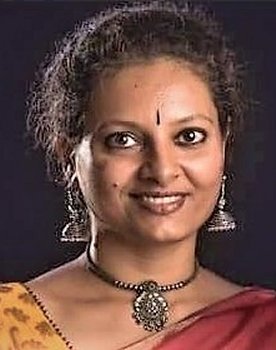 DEEPA RAGHAVAN (Bharatanatyam) RANJANIMALA Ranjanimala is a composition of Thanjavur Sankara Iyer. The Ranjanimala has been a special song for me, both musically because of the ragas and the interwoven swaras, as well as lyrically because of the emphasis on the benevolent nature of the Mother Goddess. The composition describes Her as Manda Agamani - the one with the centered, deliberate gait, beseeching Her to calm our hearts and minds; again as Maara Janani - creator of the God of Love Kama and Megharanjani - Goddess of the clouds, asking that She shower love and a sense of oneness on us all; and yet again as Paalini, the protector, praying to Her to remove all divisiveness, inequity and enmity. Language: Sanskrit Video Oct 25 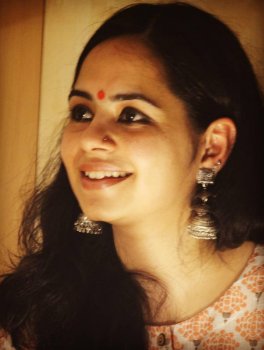 RUPANSHI KASHYAP (Kathak) @rupanshisince1990 AMBA MAADI THAARU KANKU choreographed by Guru Kumudini Lakhia is based on the Gujarati language, set to taal Rupak, created by eminent writer / composer, Late Avinash Vyas. It describes the impact of Goddess Amba's profound and powerful character on all Her children residing on the earth. It is sung by the current contemporary folk singer of Gujarat, Osman Mir Sa'ab. Language: Gujarati Video Oct 26 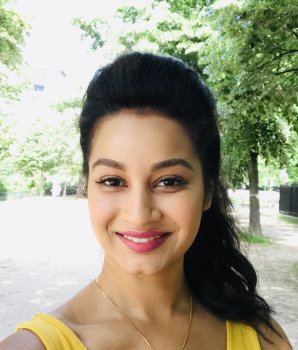 PRANAMYA SURI (Kuchipudi) @pranamyasuri NEELA DEVI Neela Devi has the hue of a dark blue lotus (karu neydal pushpam). She is said to exceed the enchanting power of Sri Devi, when it comes to overpowering Her Lord through Her bhoga Shakti. Sri Krishna is said to have conquered 7 bulls in order to win Her hand (She is also known as Nappinai). The Lord, who is ever vigilant, relaxes in Her company. In fact, He is asleep on Her bosom when Andal tries to awaken Him in the Thiruppavai. Growing up, Thiruppavai and Andal were such a big part of my life. The more I read about the mysterious Neela Devi, the more curious and fascinated I became about Her. To me, She is a symbol of not just beauty, but of exquisite goodness. This piece is not a performance, but a prayer for all of us, especially after the last two years. Neela Devi, I invoke You. You are full of compassion, have control over the Sun, and have won over the Lord Himself. You are praised by Bruhaspati, Matarishwa and Vayu. Obstacles of the three worlds are removed by Your grace. Oh Divine consort of Vishnu, who supports the earth and sky and rules over the worlds with strength and firmness, please shower us with Your compassion and mercy. That virtuousness is what won over the heart of The Lord and I would really love to share Her story! Language: Sanskrit Music: Swetha Prasad Video: AMG studios Editing: Suresh Guidance from Dushyanth Shridhar and Srilatha Suri Video Oct 27 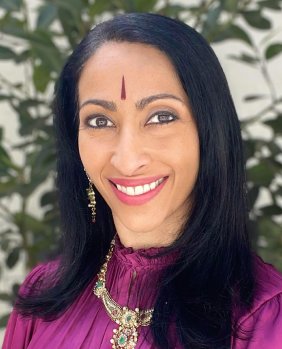 NITHYA GOPU SOLOMON (Mohiniattam) @nithyasolomon KALI An adaptation of a unique Mohiniattam choreography of Tulsidas's dadra "Jaya Jaya Jaga Janani" in Hindi. Guru Tara Rajkumar envisioned and choreographed this item for Mohiniattam, and Shobha Sekhar set it to Carnatic music. It is a unique piece, especially for Mohiniattam subject matter, and the original extended format has been adapted specially for this Devi Diaries submission. In this item, Kali is depicted as mother of the universe Prayed to by gods, humans, sages, demons The beautiful one; consort of Shiva, assuming many forms The fearsome one; removing fear, bestowing knowledge Daughter of the Himalayas, Mother of the Universe Performance: Nithya Gopu Solomon Concept & Choreography: Tara Rajkumar Videography & editing: Anandh Bala Music: Composition (Hindi): Tulsidas Music setting: Shobha Sekhar Ragam: Kamboji, Kapi, Valaji / Talam: Adi Vocals: Shobha Sekhar Mridangam: M Ravichandhira Violin: Narmatha Ravichandhira Kanchira: Hari Arulprakasam Kuzhi Thalam: Bindu Nair, Kesha Rana Video Oct 28 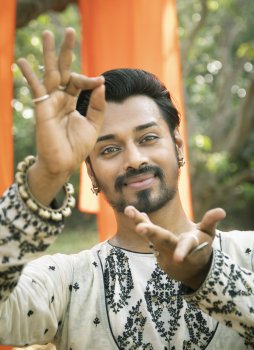 SUBHAJIT KHUSH DAS & SUBHANGIK (Neo-classical) @khush_subhajit MANASA (an excerpt from the Padma Purana by Bijay Gupta) Indian folklore and folk culture have always built a bridge between the Gods, Goddesses and us humans. Especially in Bengal, we often see the Devis are treated like their own daughter, a part of their family. In different parts of Bengal, we often find Devis who are not mentioned in Vedas. MANASA is such a Devi of Bengal's folklore. It is believed She came to Bengal with the Dravidians who worshipped Her in the hope that She would protect them against snakes. Manasa Mangal Kavya is the oldest of the Mangal Kavya. There are many versions of Manasa Mangal Kavya by different poets. In my presentation, I have taken verses from Bijay Gupta's Padma Purana. We all know the story in brief, how the snake goddess Manasa established Her worship in Bengal by converting a worshipper of Shiva (Chand Sadagar) to Her own devotee. In my piece, I have tried to show the birth of Manasa who is also known as Padmavati, Bisahari and Janguli. Also, how it is still a prime festival in different parts of Bengal. This is a Neo-Classical presentation taking influence from Bharatanatyam, Mayurbhanj Chhau and other folk dances of Bengal like 'Bou naach' and 'keertan.' Concept and choreography: Subhajit Khush Das Performed by the students and performing members of Subhangik Language: Bengali and Sanskrit (sloka) Taalamalika Project advisor: Rajiv Bardhan Music Programmed and Arranged by Panchajanya Dey Chorus: Sagnik Ganguly, Udita Roy and Sanjeeta Mallick Vocal and Sloka Composition: Jaydeep Sinha Rhythm: Arijit Saha Flute: Panchajanya Dey Mixing and Mastering: Panchajanya Dey Recorded at Panchajanya's Studio Videography & Editing: Pratyush Roy Dasgupta Dancers: Shiva - Subhajit Khush Das Manasa Devi - Subhechcha Bhattacharyya Arnab Aj Halder, Sagnik Ganguly, Nisha Bomzone, Srayasree Chatterjee, Udita Roy, Riya Das, Srijanee Adhyay, Sanjeeta Mallick Video Oct 29  SANGITA CHATTERJEE (Kathak) @sangita_chatterjee_kathak DEVI DURGA / ADI PARASHAKTI The word 'Durg' finds its etymological meaning in something which is 'invincible, unassailable' and thus it is also used for denoting "inaccessible fortress." She is the primordial cosmic energy, who moves the entire universe. She is formless yet has innumerable forms. She is the divine creative force that sustains life as well as destroys it. Devi Durga, the one who has destroyed the demons like Shumbha and Nishumbha, who rides on a tiger, who is mother of all, we pray to Her for our salvation. She is the shakti that resides within us and manifests itself when we are able to reach our primordial self. Language: Chandi Stotra (Sanskrit), Jai Durge Jagdambe Bhawani (Hindi). Video Oct 29 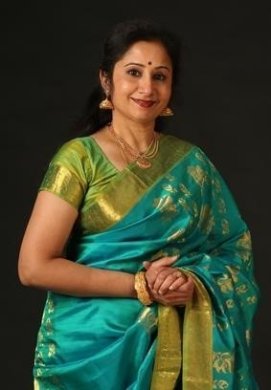 SUJATHA SRINIVASAN (Bharatanatyam) @sujathasrinivasan.skm MAHALAKSHMI HIRANMAYEEM - This beautiful song with a haunting melody describes Goddess Mahalakshmi, who arose from the milky ocean. Adorned with precious ornaments, yellow robes and lotus garlands, She has a radiant face like that of the cool moon and feet like tender shoots. Praised by the learned as the divine Mother, Lakshmi bestows everlasting prosperity and dallies with our past and future. She revels in the enjoyment of music and resides in the heart of Her consort Lord Vishnu. Muthuswamy Dikshitar offers his worship to this Goddess with the golden hued form and renounces the relationship with materialistic minded people. Like the Chintamani gem, She blesses her devotees who seek refuge with immortal treasures. Ragam: Lalita, Thalam: Rupakam Language: Sanskrit Choreography & Performance: Sujatha Srinivasan, Shri Kalaa Mandir Vocals: Shriya Srinivasan Videography: Srinivasan Ranganathan Video Oct 30  POOJITHA BHASKAR (Bharatanatyam) @poojitha_bhaskar LALITHAMBIKA "Sri Ramaa Saraswathi" is a beautiful krithi composed by Muthuswamy Dikshitar in Sanskrit. Goddess Lalitha, the one who is served by Mahalakshmi and Saraswathi. She is resplendent with a star like nose jewel and served by Goddess Sampatkari, One who is surrounded by the Goddesses like Tara and Mantrini, the one celebrated by the brave Guruguha. She who completes Shiva and whose compassion has no boundaries. Seeking Her blessings. Set to Nasamani, adi talam. Video Oct 30  DEEPALI SALIL (Bharatanatyam) @deepali.salil DEVI DHUMAVATI Devi Dhumavati is one of the Dasha Mahavidyas. She is an old widow, associated with things considered inauspicious and unattractive. She is made up of smoke, the smoke that remains from the ashes after the world is destroyed by fire. She is always hungry, thirsty and initiates quarrels. But this very form is trying to teach us to look beyond the superficial, to look inwards and seek the inner truths of life. Through this form, She wants to reveal to us the ultimate knowledge of the universe, which is beyond the illusory divisions, like auspicious and inauspicious. The seed which Adi Parashakti has sown in us is brought to its true purpose by Devi Dhumavati. Language: Sanskrit Video Oct 31 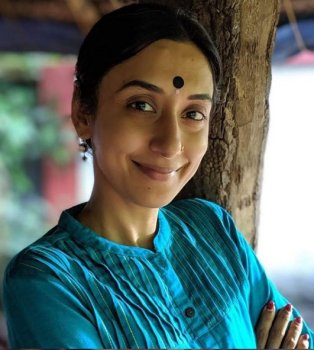 BINDU RAJENDREN (Mohiniattam) @bindurajendren MOOKAMBIKA DEVI This composition in Malayalam - presented here as a short Bhavabhinayam - is a salutation to Kollur Mookambika Devi who is revered and worshipped as Shakti Devatha or Adi Parashakti. The translation of the lyrics is as follows: Oh! Radiant and awe-inspiring goddess who removes obstacles The one who finds joy in words, meditation, veena and music Oh! Illuminated and enlightened one Pure and possessed of goodness The queen of the three worlds Oh! Mother of the universe Please make my heart your home. Your form is the totality of Brahma, Vishnu, Maheshwara and all other deities You are the absolute reality Oh! Goddess with lotus shaped eyes, sweet face and perfect cheeks Your neck adorned with gems aplenty Salutations to the enchantress of the universe. You reveal truth through knowledge Oh formless one Goddess of Kollur Who enlightens through sweet teachings of knowledge and removes ignorance Oh Durga, who destroys misfortunes and restores peace Please bestow compassion on me - an unintelligent soul Oh! Kartyayani, protect me. Language: Malayalam Concept, choreography, set design and performance: Bindu Rajendren Composer: Dr. Rajagopalan Music arrangement and Vocals: Venugopal S.K. Videography: Raj Kallath Video Oct 31 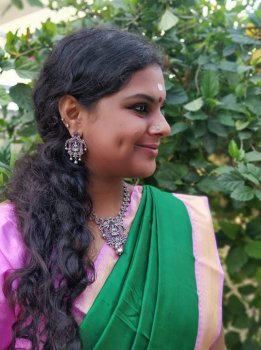 PARUR M.S. ANANTHASHREE (Bharatanatyam) @ananthashree THULASAMMA - Mahalakshmi Incarnate The ten days following the Mahalaya Amavasai is widely celebrated as Navaratri, Dussera, Durga Puja, Sharad Navaratri, etc. In most parts of India, it is the worship of the Mother Goddess or Durga which takes predominance and the 9 nights are dedicated to Durga, Lakshmi and Saraswathi - the three aspects of the Mother Goddess namely Power or Strength, Wealth and Knowledge. My presentation focusses on the aspect of Mahalakshmi, the Goddess of wealth and prosperity who is present as the physical incarnation on Earth as Tulasi in every household. The different parts of the Tulasi plant are believed to be the abode of various deities and sacred texts of Sanatana Dharma. Tulasi is also known as Vrinda and is a consort of Mahavishnu. She is believed to be the gateway to Vaikuntha, the abode of Lord Mahavishnu thereby relieving mankind from the endless cycle of births and deaths and attain moksha or liberation. Saint Thyagaraja in his kirtanam "Thulasamma" in ragam Devagandhari and adi talam has brought out all these salient aspects of this auspicious plant/herb. The incident when Lord Krishna proved to His consort Sathyabhama that intense devotion to Him like the one Rukmini had for Him is the only way to get closer to Him and not wealth, money or gold is elaborated at the appropriate part of the kirtanam. I will be dancing, providing vocals, playing the violin accompaniment and performing the nattuvangam for the presentation. Language: Telugu Video Post your comments Pl provide your name and email id along with your comment. All appropriate comments posted with name and email id in the blog will be featured in the site. |